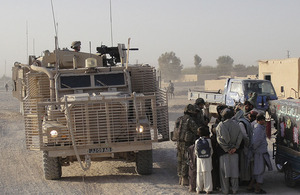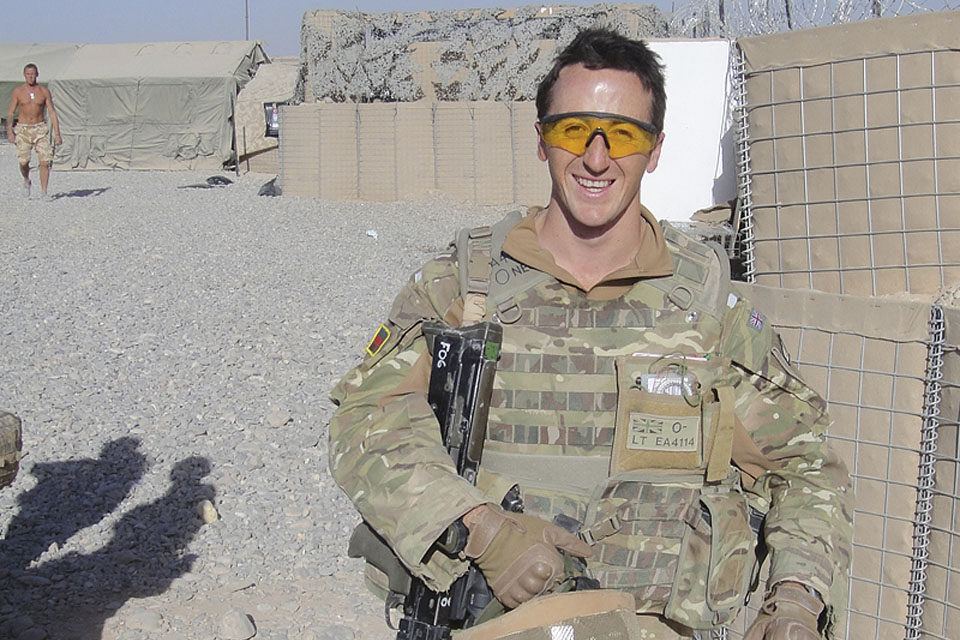Tank Regiment builds relationships with Helmand people
Having completed their final in-country training, soldiers from the 2nd Royal Tank Regiment's Falcon Squadron have been out talking with their new neighbours in the Lashkar Gah area this week.

British soldiers dismount from a Mastiff armoured patrol vehicle to chat with locals in Lashkar Gah [Picture: Captain Tom Lloyd-Jukes, Crown Copyright/MOD 2010]
Every time the ‘Tankies’, as the soldiers are known, move around the city, they make an effort to interact with the people they have come to protect. For the soldiers in their armoured vehicles this means stopping, getting out, and talking with the local people.
Lieutenant Jonny Eaton, aged 26, from Ely, explains why this ‘human face’ is so important:
We need to talk to the people in order to understand the complexities of the environment we have come to.
Our vehicles are incredible pieces of kit - we wouldn’t be without them - but driving through a village in a Mastiff wins you no friends. You have to get out and engage with people face to face if you want to understand them and them to understand you.
By going out and finding what the people need we can help the Afghan government deliver development to their people. The soldiers can also find out what the local people think of them.

Lieutenant Jonny Eaton [Picture: Captain Tom Lloyd-Jukes, Crown Copyright/MOD 2010]
“We have recently returned from a patrol out to a school in Mukhtar South. Our vehicles are the biggest in the area but on this latest patrol the teachers said they were happy to see us as our presence made them feel secure.”
In an organised influence operation earlier in the week, the 2nd Royal Tank Regiment (2 RTR) soldiers attached to the 2nd Battalion the Royal Regiment of Scotland (2 SCOTS) Battle Group moved down to the town of Qal’ah Bost, south of Lashkar Gah. The aim was to hold a shura, or traditional meeting, with around 50 local residents including local leaders, known as elders.
The shura was chaired by a government representative with responsibility for development of the region. The military component of the meeting was provided by Major Chris Fisher, 35, Officer Commanding FALCON Squadron 2 RTR.
There were two parts to the meeting: The primary interest was to discuss with the local elders their needs and problems. The elders’ concerns are simple and understandable. What is being done to improve the level of medical care given to the area by the Afghan government? Will the government and ISAF help rebuild their school which was destroyed by the insurgents? Will ISAF help in improving the supply of clean water?
The secondary aim of the meeting was to discover the elders’ reaction to an arrest operation carried out by ISAF shortly before.
The elders were welcoming and keen to talk to both government representatives and soldiers. The theme was one of co-operation to improve life for the people and bring forward security.
Maj Fisher said:
There is a deal of horse-trading as the elders describe what they want and we explain what is reasonable and achievable. For example, when it came to rebuilding the school, we in partnership with the Afghan government can provide the materials to repair the school but the local people must work on the project - remove the rubble and repaint the walls, for example. That way we create a culture of self-help rather than dependency.
Having discussed how the British Forces could assist in developing Qal’ah Bost, the shura turned to look at security in the area. The elders were happy to discuss the issue as they felt that the British soldiers were good for the security of their homes. Furthermore, they reported that an earlier arrest operation had been successful - at least one of the men detained was a known insurgent.
Maj Fisher added:
This information is highly valuable and a meeting like this allows us to reassure the people. Detainees will not be harmed and all cases will be investigated and any innocent people will be returned to their communities as soon as possible.
The last act of the meeting was to agree to repeat the shura for a follow up discussion of progress. The Tankies are looking forward to more close co-operation with the people of Qal’ah Bost throughout their tour of duty.